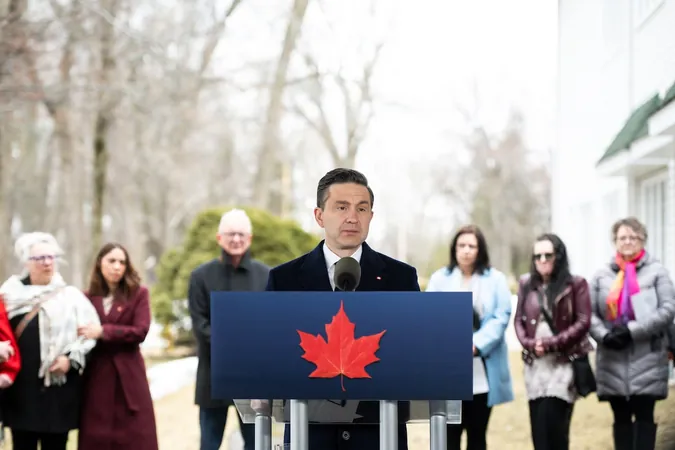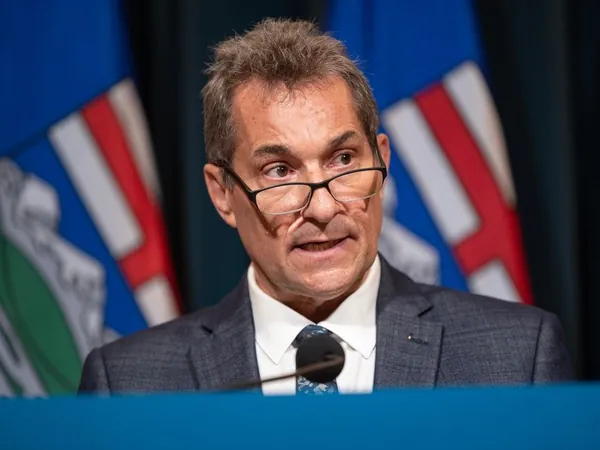
Poilievre Declares Canada Will Determine Its Own Defence Budget Amid U.S. Pressure for NATO Spending Hike
2025-04-04
Author: Benjamin
Poilievre's Stance on Defence Budget
Pierre Poilievre, the leader of Canada's Conservative Party, has emphasized that under his government, Canada will independently decide its defence budget in the face of renewed calls from U.S. President Donald Trump for NATO allies to increase military spending to a staggering 5% of their GDP.
U.S. Expectations and Canada's Current Spending
During a NATO foreign affairs ministers meeting in Brussels, U.S. Secretary of State Marco Rubio reiterated America's expectations for alliance members to ramp up their defence expenditures. Currently, Canada's defence spending stands at approximately 1.37%, with a commitment to reach 2% by the year 2030. However, no NATO member has yet signaled a willingness to meet the ambitious 5% target, although Rubio confirmed that the U.S. is planning to do so.
Canadian Independence in Defence Decisions
Responding to inquiries from reporters during a campaign visit to Quebec, Poilievre assured Canadians that spending decisions would be made nationally. "We’re going to make our own decisions on exactly how much we spend. We’ll focus on our military needs," he remarked, clearly distancing Canada’s fiscal strategy from U.S. influence.
Military Capability and Proposed Developments
The discussions come amid an atmosphere of tension between Canada and the U.S., where Trump's controversial remarks about potentially annexing Canada as the "51st state" have raised alarms. Poilievre's commitment to strengthening Canada's military forces is underscored by his proposals for enhanced capabilities, which include developing four new heavy-duty icebreakers and establishing a new military base in Iqaluit.
Financial Implications of 5% Spending Goal
Experts have noted that meeting Trump's 5% spending goal would impose a significant financial burden on Canada, with estimates from David Perry, president of the Canadian Global Affairs Institute, suggesting an additional $100 billion in annual military expenditure.
Focus on Capability Over Spending Percentages
In a divergence from the GDP metric commonly referenced for defence budgets, retired General Wayne Eyre argued that Canada should prioritize military capability and preparedness over arbitrary percentages. "What matters is assessing the threats we face, formulating plans to address them, and establishing the necessary capabilities," he explained.
Broader Social Issues and Domestic Violence Initiatives
Beyond defence spending, Poilievre has also unveiled plans targeting domestic violence, vowing to enact stringent laws against intimate partner violence, including the introduction of an 'assault of an intimate partner' offense and stringent bail conditions for offenders.
Conclusion: Political Accountability and Priorities
He criticized the current justice system, asserting, "Government has failed the most vulnerable Canadians. Those who abuse their partners or children should be off the streets." According to Poilievre, the age of political accountability and prioritizing the safety of victims over perpetrators is at hand.
Looking Ahead to Elections
As the debate intensifies over Canada’s future military posture and social policies, Poilievre is positioning himself as a leader ready to take a firm stand, not only on defense but also on critical social issues that resonate with Canadians. The extent to which Canada will align with U.S. expectations will be one of the key themes leading into the upcoming elections.









 Brasil (PT)
Brasil (PT)
 Canada (EN)
Canada (EN)
 Chile (ES)
Chile (ES)
 Česko (CS)
Česko (CS)
 대한민국 (KO)
대한민국 (KO)
 España (ES)
España (ES)
 France (FR)
France (FR)
 Hong Kong (EN)
Hong Kong (EN)
 Italia (IT)
Italia (IT)
 日本 (JA)
日本 (JA)
 Magyarország (HU)
Magyarország (HU)
 Norge (NO)
Norge (NO)
 Polska (PL)
Polska (PL)
 Schweiz (DE)
Schweiz (DE)
 Singapore (EN)
Singapore (EN)
 Sverige (SV)
Sverige (SV)
 Suomi (FI)
Suomi (FI)
 Türkiye (TR)
Türkiye (TR)
 الإمارات العربية المتحدة (AR)
الإمارات العربية المتحدة (AR)